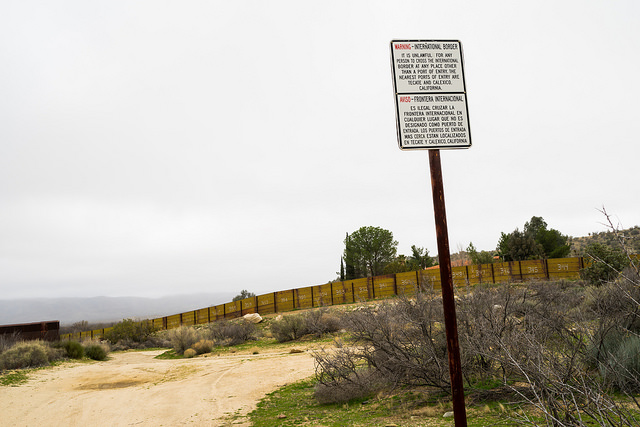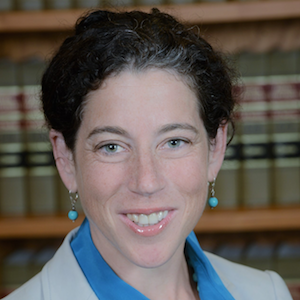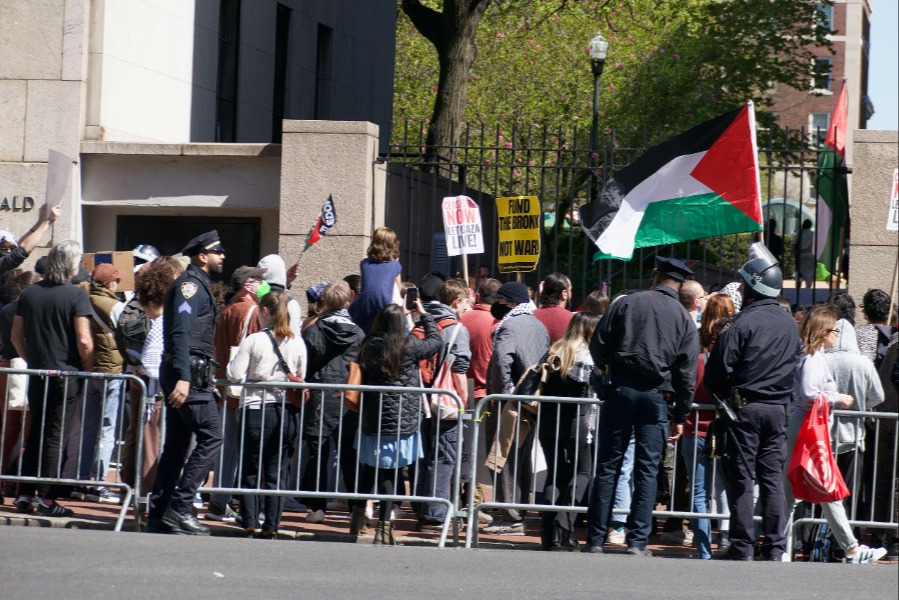Enslaved and Forced to Watch Her Husband Dig His Own Grave—And Labeled A Terrorist As A Result
With all the immigration-related action of late, it was pretty easy to overlook last week’s decision by the Board of Immigration Appeals in the Matter of A-C-M. We write to say you should take note.

Published by The Lawfare Institute
in Cooperation With

With all the immigration-related action of late, it was pretty easy to overlook last week’s decision by the Board of Immigration Appeals in the Matter of A-C-M. We write to say you should take note. Few cases are better examples of ill-conceived process and the coarsening of the American spirit.
In the Matter of A-C-M, the Board of Immigration Appeals (BIA) concluded that a woman who was “kidnapped and required to perform cooking and cleaning for [El Salvadoran] guerrillas under threat of death” is—based on the cooking and cleaning done while enslaved—a material supporter of terrorism and therefore ineligible for asylum. The immigration judge who initially heard the case stated that he would have granted the woman—who was “forced to witness her husband … dig his own grave before being killed”—asylum, but for the terrorism-related bars.
This is absurd and cruel. It’s also, as we’ll explain, procedurally nonsensical. And it’s bad for national security to boot. Are we really so fearful that we can no longer no longer distinguish between terrorists and their victims? What little moral standing we have left is squandered if we engage in a this kind of category collapse—expecting the world to follow us in our fight against terrorism, only to treat the killing of civilians and the enslaved victims of those who kill civilians as one and the same.
Unfortunately, this is not a new problem. It began under the George W. Bush administration, remained a problem under the Obama administration, and continues into the present.
A bit of statutory background: Quite sensibly, immigration law prohibits terrorists and their material supporters from entering the country or gaining any immigration benefits (such as asylum or deferral of removal) once in the United States. The problem is that the definition of what it means to be a material supporter of a terrorist organization is, by executive and judicial interpretation, exceedingly broad. It has been interpreted to cover those who, like the victim in last week’s court ruling, have been enslaved by their captors and who act under duress.
Material support has also—per last week’s ruling—been interpreted to cover even de minimus support. In the words of the BIA: “While the respondent’s assistance may have been relatively minimal, if she had not provided the cooking and cleaning services she was forced to perform, another person would have needed to do so.”
Back in 2006, Congress recognized these and other unintended consequences of the ways in which the terrorism-related bars to admission were drafted. Led by the bipartisan alliance of then-Sen. Jon Kyl, R.-Ariz., and Patrick Leahy, D.-Vt., Congress provided the Secretary of Homeland Security and Secretary of State new discretionary exemption authorities, enabling them to waive a range of terrorism-related bars on admission to avoid these kind of bizarre results.
Within months of enactment, George W. Bush’s then-Secretary of Homeland Security Michael Chertoff signed a memo explicitly authorizing the exercise of this discretion in situations in which an alien is forced, under duress, to provide support to certain groups that qualify as terrorist organizations under immigration law. (Per statute, the exemption did not and could not cover support provided to designated foreign terrorist organizations such as al-Qaeda or the Taliban.) In 2014, the exemption authority was expanded to cover “insignificant” amounts of support.
The exemption authority was adopted despite legitimate concerns that it might be misapplied. Some feared, for example, that fictitious claims of duress could be used to excuse real misconduct and that credibility issues would overwhelm decision makers. In the end, however, two things were clear: First, the criminal law’s long experience with claims of duress meant that the adjudication of such claims was manageable. Second (and more importantly) any system of asylum that claimed to have a moral compass simply had to—in some way—account for the brutality of terrorist organizations and therefore not punish their victims for, in effect, being victimized.
The exemptions themselves include a number of checks to prevent fraudulent claims and ensure that dangerous individuals are not inadvertently admitted. Waivers are available only to those who have undergone and passed all other relevant background and security checks; would be eligible for asylum or other immigration but-for the material support bars; are found to pose “no” danger to the safety and security of the United States; and have been truthful in their applications. (Additional information on the exemption process can be found here.)
Yet, rather than exercise the statutorily-provided exemption authority in A-C-M’s case, the executive—back in 2014—appealed the immigration judge’s decision to grant her cancellation of removal. And in this appeal decided last week, it subsequently fought her attempt to seek asylum.
Perhaps there is some good reason why A-C-M should be kept out of the country. If there is, we want to know it—but absent some basis for the executive’s actions, we are concerned. There are terrorism threats facing us all around the world, which we should all be attuned to, focused on, and fighting. In the midst of these ongoing efforts, this expenditure of resources—and labeling of a victim of terror as a terrorist—is mystifying and dangerous.
There is plenty of blame to go around.
First, the courts. As BIA Judge Linda Wendtland points out, concurring in part and dissenting in part, the word “material” becomes superfluous if not interpreted to have independent meaning. The statute itself lists a concededly non-exhaustive list of what constitutes “material” support, including things like the provision of a safe house or weapons. Forced cooking and cleaning is different in kind. In Judge Wendtland’s words: “Cooking and cleaning services for individuals who happen to belong to a terrorist organization cannot validly be placed in the same category as items that can be used to plan and carry out the organization’s goals.”
The courts’ interpretation regarding duress is equally troubling. The statue is silent on the issue; it neither explicitly includes nor explicitly precludes a duress exception. Yet the same is true of criminal law, and courts have—quite appropriately—read into criminal law statutes a duress exception, albeit one that has been interpreted narrowly and applied relatively infrequently.
Second, the executive. Why in 2014 did the Obama administration expend resources appealing A-C-M’s case in the first instance? And why did it repeat the error in 2016 by opposing A-C-M’s argument for asylum? Why not instead use the discretion that Congress gave the executive and that was intended to avoid these ludicrous results? The result is wasteful, embarrassing, and detrimental.
The answer appears to lie, in part, in a rather absurd policy choice. The Obama administration established a policy under which the decision to grant or deny a requested waiver will only be made at the conclusion of the judicial process. Pursuant to this policy, a waiver may only be granted once an immigration judge has made a final decision of removal and announced that “but for” the material support bar, the asylum seeker would have been granted asylum. The,opinion must either be affirmed by the Board of Immigration Appeals or the time to seek BIA review must expire. Only then can the applicant receive a waiver. In effect, applicants in A-C-M’s position must go through an entire judicial process—at great expense to themselves and to the immigration system—before they may avail themselves of the opportunity to seek a waiver.
But even setting this policy aside, it is also a problem that, more than a decade after the establishment of the waiver system, there is no established mechanism for qualified individuals to seek an exemption if and when eligible. To the contrary, President Trump’s immigration executive orders have suggested that exemptions that do exist might be in jeopardy; see section seven here and related discussion here. This should be changed. Eligible applicants should be able to raise their claims and seek a waiver early in the process in order to avoid the costly litigation and absurd results.
***
We can do better than this. Terrorists should be denied admission to our nation. But we should be able to distinguish between those that seek to do us and others harm and the victims of the very groups we oppose. And A-C-M should be granted a waiver.




.jpeg?sfvrsn=6117c6bf_4)

